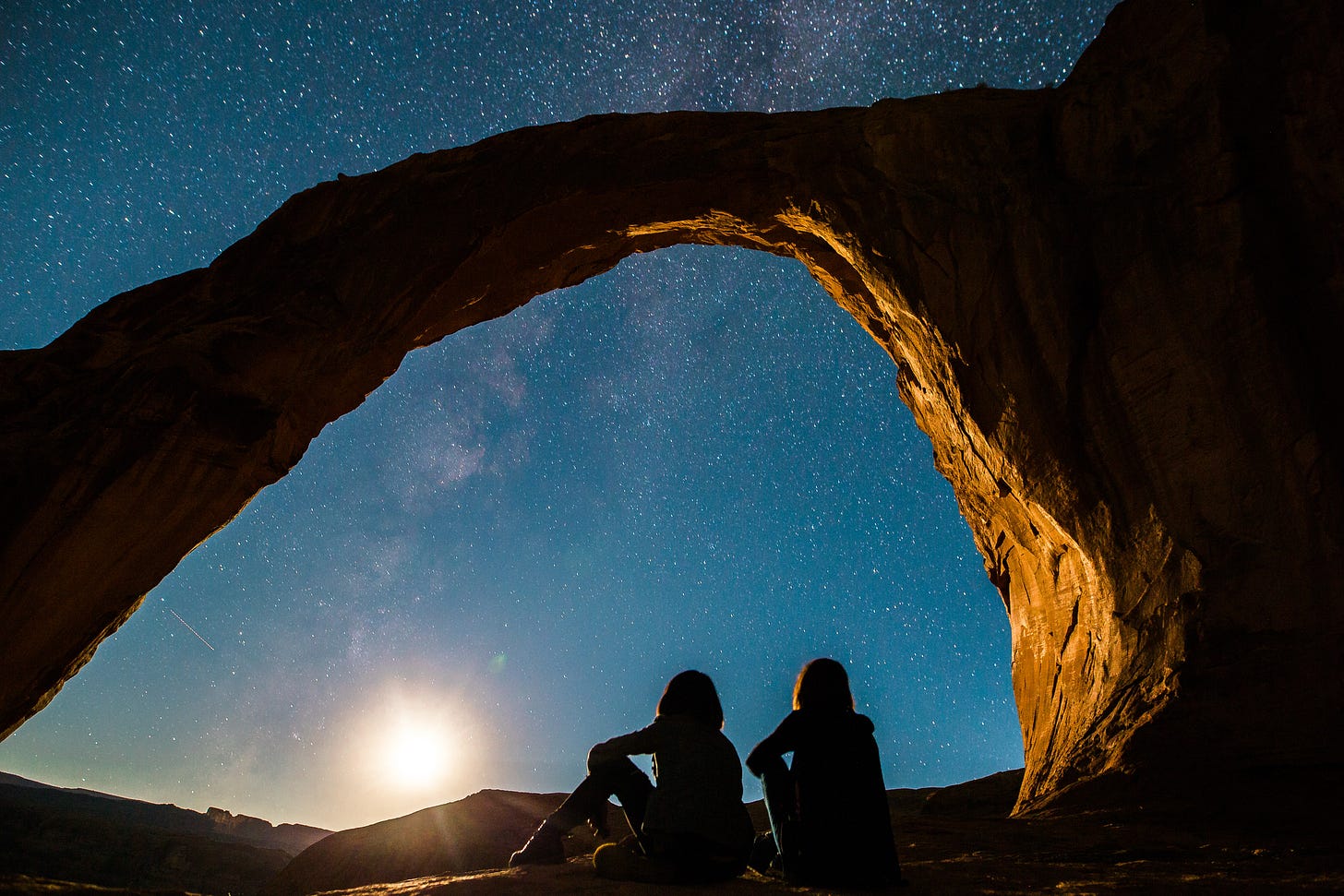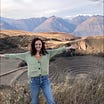I Will Bathe In Wonder

“Everywhere, there was a great tumult. People rose up and demanded the wonder restored to their lives. It was a glory to behold.” —Tom Hirons, “Scrimstone”
At the heart of everything, there is mystery. The more I am curious about this mystery, and do not fear it, the more enchantment and wonder I experience. Everyday moments take on a surreal feel as I become aware of the realm I inhabit, as well as other realms that suddenly feel closer. I imagine my skeleton, my bones not so different from the ground I walk on, not so different from the stars in our galaxy. I lay on the Earth who nourishes me, delight in the warmth of the Sun. I feel the tingle of energy that animates me, and I’m grateful, so grateful to be here; for however long that is, it’s a wondrous gift.
I am an earthly being, entangled with the stars.
William Shatner, who played Captain Kirk on “Star Trek,” actually voyaged to space in 2021. This October, he published a book called “Boldly Go: Reflections on a Life of Awe and Wonder.” My interest piqued, I read an excerpt, and this excerpt-of-the-excerpt alone is touching:
“I had thought that going into space would be the ultimate catharsis of that connection I had been looking for between all living things—that being up there would be the next beautiful step to understanding the harmony of the universe. In the film ‘Contact,’ when Jodie Foster’s character goes to space and looks out into the heavens, she lets out an astonished whisper, ‘They should’ve sent a poet.’ I had a different experience, because I discovered that the beauty isn’t out there, it’s down here, with all of us. Leaving that behind made my connection to our tiny planet even more profound.
“It was among the strongest feelings of grief I have ever encountered. The contrast between the vicious coldness of space and the warm nurturing of Earth below filled me with overwhelming sadness. Every day, we are confronted with the knowledge of further destruction of Earth at our hands: the extinction of animal species, of flora and fauna . . . things that took five billion years to evolve, and suddenly we will never see them again because of the interference of mankind. It filled me with dread. My trip to space was supposed to be a celebration; instead, it felt like a funeral.”
Though I’ve never been to space, I relate to how he felt. Several months ago I did a guided meditation, wherein I had a vision. Images floated into my mind’s eye, and a narrative naturally emerged around what I was seeing. It felt like something between a dream and a memory. Regardless of how it came to mind, the vision has helped awaken me to what’s really important — like a personal guiding myth.
I wrote it down right afterward:
I come from a dusty planet far from Earth — a planet with more sand than we knew what to do with. Very little lived on this planet, but my people could survive. We typically took the form of super-intelligent feline-like creatures that walked on two legs, and wore clothing to protect us from the elements. But we were shapeshifters: skilled in changing our form. This allowed us to travel, purely as a source of energy, quickly and easily through the cosmos.
One day while traveling I saw Earth, and was struck by how colorful it was and how alive it seemed. As vast as the universe is, and as far and wide as I had traveled, I had not yet seen a planet so beautiful and inviting. But I could sense trouble. The humans were taking the abundance for granted. Somehow, a great many of them were starting to value things that were tearing the planet apart.
I felt that I wanted to help. At some point, I reincarnated as a human. In my first form I was a wanderer who traveled alone through different lands — prairies and settlements with great markets. I was a medicine maker, and sold my goods and other valuables in these cities and markets, and to whoever I would encounter in between. Although I was young, people trusted me and invited me into their homes. It was through wandering and offering things of value that I got to know humans better.
In the form I’m in now, I emerged in the desert — in a way, like my homeland. Yet still a greater diversity of beings live in this desert than on my own planet. I thought I would enjoy being in the desert again, but it turns out I’ve grown quite fond of the forests and waters of Earth. In a way, that’s part of why I came here to begin with: the beauty, and how unique it is. I am restless to experience the beauty of a great many places on this planet. It’s astounding how different the ecosystems are. But I can’t forget what I am really here to do . . . to, as much as I can, snap people out of their destructive reverie and remember the majesty of this planet they’re a part of. The Earth is hurting, and we must help her heal.
This “pale blue dot” we’re on is really something special. You don’t have to be an astronaut to see that. Earth is an ancient, conscious being: alive. (Many indigenous cultures refer to this planet as Mother Earth, so I too will call her “she,” even if reality is more complex.) Earth provides for everyone, with the help of the Sun. Do you feel her wisdom, her generosity, her creativity, her energy? Her love?
Earth doesn’t need to be saved. She needs us to love her back. To open our senses, pay attention, embrace our gifts, and remember who we are. She needs us to slow down. In our rush to “save the world” from destruction we caused, we are only hurting her more.
Bayo Akomolafe writes in “A Slower Urgency,” “The modern figuration of crisis has enrolled reactionary platforms, where the urgency of a situation is the sole argument for sidestepping complexity and ‘doing something’ now.” We must stop simply reacting and, as Akomolafe says, “question our questions.” Otherwise we risk perpetuating the same patterns of injustice under a greenwashed facade.
We — in my culture, at least — have been living under the delusion that endless growth of our civilization is not only possible but also desirable, and that humans are entitled to any and all of Earth’s “resources.” Even the word “resources” encourages us to forget that everything is interconnected and conscious, even if we don’t fully understand these complexities. When we speak of resources we are permitting ourselves to waste them, because resources are in seemingly ceaseless supply. These resources are actually our kin, prompting many people to instead call them “relatives,” and every time we use something — cut down a tree, eat a carrot — we are taking a life. We cannot avoid this.
We are endlessly dancing with death and instead of seeing that as essential, sacred, and even beautiful, we pretend everything was never really alive, just cogs in a machine. Our machine. It’s easier to pretend trees aren’t living, conscious beings when we cut them down than it is to get consent, offer gratitude and use their bodies respectfully. It’s easier to pretend only animals with faces are living, conscious beings than come to grips with the fact that no matter what we eat, every single person on Earth needs a steady diet of death to survive.
When I truly think about the interwoven energies and elements that make up me, at least in this form, I want to honor all that my life requires by living with reverence and reciprocity. Sometimes I fail at this, but I’m trying. I am thankful to remember I am multidimensional in a society that tries to flatten me into an existence where being a good citizen means being a dutiful over-consumer who adds to my country’s GDP.
No: I am a miracle!
If we think about it at all, or better yet, put our minds aside and let awareness take over, we can feel our existence as truly wondrous; even our routine tasks are infused with magic if we choose to sense it. Sometimes I feel like there’s someone screaming (lovingly) at me, “WAKE UP! EXPERIENCE THE MAGIC!” Often the beings shaking me awake are the wind and the trees, in partnership; have you ever heard the creak of a great big tree swaying in the breeze? It’s my favorite sound. Every time I hear that, it’s like a weathered, wooden door is creaking open in my imagination — a portal to possibilities. It’s the sound of curiosity.

In her forthcoming book “The Power of Wonder,” Monica C. Parker writes: “[S]omething happens as we move from the wonder-filled days of childhood to obligation-laden days of adulthood. We become increasingly jaded. Like the sun that continues to shine on a cloudy day, wonder is still there, but we just can’t seem to see it anymore. And then one day we stop looking.”
I will never stop looking for wonder . . . I will bathe in wonder. I will let wonder wash over me until I am wide-eyed and ecstatic, pulsing with the consciousness that runs through all of us and everything. I will enjoy my human life and when it’s time to die, I will not cling to regret. I will let my body sink back into the warm Earth, the atoms rearranging themselves once again.
Thank you for reading this piece by our friend Kayla Frost. Please give her follow on Instagram, and check out some of her other work here and here.
If you enjoyed this piece of writing, please consider subscribing to Death in The Garden. All paid subscriptions fund the film we are making, the podcast we are producing alongside the film, and writing like this. Consider joining our Patreon if you would like to support us more and receive more perks, like joining a Discord group with Kayla and many other amazing, inspiring people.






